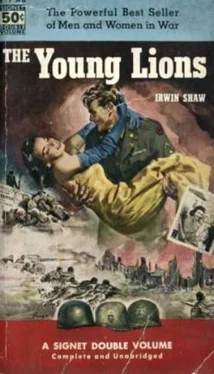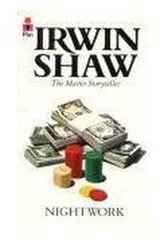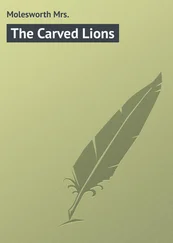Irwin Shaw - The Young Lions
Здесь есть возможность читать онлайн «Irwin Shaw - The Young Lions» весь текст электронной книги совершенно бесплатно (целиком полную версию без сокращений). В некоторых случаях можно слушать аудио, скачать через торрент в формате fb2 и присутствует краткое содержание. Жанр: Классическая проза, на английском языке. Описание произведения, (предисловие) а так же отзывы посетителей доступны на портале библиотеки ЛибКат.
- Название:The Young Lions
- Автор:
- Жанр:
- Год:неизвестен
- ISBN:нет данных
- Рейтинг книги:4 / 5. Голосов: 1
-
Избранное:Добавить в избранное
- Отзывы:
-
Ваша оценка:
- 80
- 1
- 2
- 3
- 4
- 5
The Young Lions: краткое содержание, описание и аннотация
Предлагаем к чтению аннотацию, описание, краткое содержание или предисловие (зависит от того, что написал сам автор книги «The Young Lions»). Если вы не нашли необходимую информацию о книге — напишите в комментариях, мы постараемся отыскать её.
The Young Lions — читать онлайн бесплатно полную книгу (весь текст) целиком
Ниже представлен текст книги, разбитый по страницам. Система сохранения места последней прочитанной страницы, позволяет с удобством читать онлайн бесплатно книгу «The Young Lions», без необходимости каждый раз заново искать на чём Вы остановились. Поставьте закладку, и сможете в любой момент перейти на страницу, на которой закончили чтение.
Интервал:
Закладка:
In the middle of a passage Roger stopped. He sat at the piano with his long hands resting on the keyboard, staring at the scratched and polished old wood. Then he swung round.
"The house is yours," he said.
"What?" Noah opened his eyes.
"I'm going in tomorrow," Roger said. He spoke as though he were continuing a conversation with himself he had been conducting for hours.
"What?" Noah looked closely at his friend to see if he had been drinking.
"The Army. The party's over. Now they begin to collect the civilians."
Noah felt dazed, as though he couldn't quite understand the words Roger was using. Another night, he felt, and I could understand. But too much has happened tonight.
"I suppose," Roger said, "the news has reached Brooklyn."
"You mean about the Russians?"
"I mean about the Russians."
"Yes."
"I am going to spring to the aid of the Russians," Roger said.
"What?" Noah asked, puzzledly. "Are you going to join the Russian Army?"
Roger laughed and walked over to the window. He stood there, holding on to the curtain, staring out. "Not exactly," he said. "The Army of the United States."
"I'll go in with you," Noah said suddenly.
"Thanks," said Roger. "Don't be silly. Wait until they call you."
"They haven't called you," said Noah.
"Not yet. But I'm in a hurry." Roger tied a knot reflectively in the curtain, then untied it. "I'm older than you. Wait until they come for you. It'll be soon enough."
"Don't sound as though you're eighty years old."
Roger laughed and turned round. "Forgive me, Son," he said. Then he grew more serious. "I ignored it just about as long as it could be ignored," he said. "Today, when I heard it over the radio, I knew I couldn't ignore it any more. From now on the only way I can make any sense to myself is with a rifle in my hand. From Finland to the Black Sea," he said, and Noah remembered the voice on the radio. "From Finland to the Black Sea to the Hudson River to Roger Cannon. We're going to be in soon, anyway. I want to rush to it. I've waited around for things all my life. This thing I want to take a running broad jump at. What the hell, I come from an Army family, anyway." He grinned. "My grandfather deserted at Antietam, and my old man left three illegitimate children at Soissons."
"Do you think it'll do any good?" Noah said.
Roger grinned. "Don't ask me that, Son," he said. "Never ask me that." Then he spoke more soberly. "It may be the making of me. Now, as you may have noticed, I have no goal in life. That's a disease. In the beginning it's no worse than a pimple and you hardly notice it. Three years later the patient is paralysed. Maybe the Army will give me a goal in life…" He grinned. "Like staying alive or making sergeant or winning some war. Do you mind if I play the piano again?"
"Of course not," Noah said dully. He's going to die, a voice seemed to be saying; Roger is going to die, they're going to kill him.
Roger sat down at the piano once more and placed his hands reflectively on the keys. He played something Noah had never heard before.
"Anyway," said Roger above the music, "I'm glad to see you and the girl finally went and did it…"
"What?" Noah asked, hazily trying to remember if he had said anything. "What're you talking about?"
"It was sticking out all over your face," Roger said, grinning.
"Like an electric sign." He played a long passage in the bass.
Roger disappeared into the Army the next day. He wouldn't let Noah go down to the recruiting station with him, and he left him all his belongings, all the furniture, all the books, and even all his clothes, although they were much too large for Noah. "I won't need any of this stuff," Roger said, looking around critically at the accumulation of the baggage of his twenty-six years. "It's just junk anyway." He stuffed a copy of the New Republic into his pocket to read on the subway ride down to Whitehall Street, smiling and saying, "Oh, what frail weapon I have here," and waved at Noah and jammed his hat at his own private angle on the lean, close-cropped head, and once and for all left the room in which he had lived for five years. Noah watched him go, with a choked feeling in his throat, and a premonition that he would never have a friend again and that the best days of his life were past.
Occasionally Noah would get a dry, sardonic note from some camp in the South, and once a mimeographed company order announcing that Private Roger Cannon had been promoted to Private First Class, and then there was a long lapse until a two-page letter came from the Philippines, describing the red-light section of Manila and a half-Burmese, half-Dutch girl who had the S. S. Texas tattooed on her stomach. There was a postscript, in Roger's sprawling handwriting. "P.S. Stay out of the Army. It is not for human beings."
CHAPTER SEVEN
CHRISTIAN found it hard to keep his mind on the moving picture. It was a fairly good picture, too, about a detachment of troops in Berlin for one day in 1918 en route from the Russian Front to the Western Front. The Lieutenant in the picture was under strict orders to keep his men together at the station, but he understood how much they wanted to see their wives and sweethearts, after the ferocious battles in the East and the fatal battles-to-come in the West. At the risk of court-martial and death, he permitted them to go to their homes. If any one of them failed to get back to the station on time, the Lieutenant's life would be forfeit. The picture followed the various men. Some got drunk, some were tempted by Jews and defeatists to remain in Berlin, some were nearly persuaded by their wives, and for a while it was touch-and-go whether the Lieutenant would survive the gamble. But finally, in the nick of time, the last soldier made the station just as the train was pulling out, and it was a solid band of comrades who started towards France, having vindicated their Lieutenant's faith in them. The picture was very well done. It cleverly demonstrated that the war had not been lost by the Army, but by the faint-hearts and the traitors at home, and it was full of touches of humour and pathos.
Even the soldiers who were sitting in the troop theatre all around Christian were moved by the actors playing soldiers in another war. The Lieutenant was a little too good to be true, of course, and Christian had never come across one quite like him. Lieutenant Hardenburg, Christian thought dryly, could profit by seeing this picture a few times. Since the one day of relaxation in the brothel in Paris, Hardenburg had grown more and more rigid with the lengthening of the war. Their regiment had had their armour taken from them and had been moved to Rennes. They had been stationed there, as policemen, more than anything else, while the war with Russia had started and all of Hardenburg's contemporaries were winning honours in the East.
One morning Hardenburg had read that a boy with whom he had been at the officers' school – they all called him Ox because he was so backward – had been made a Lieutenant-Colonel in the Ukraine, and Hardenburg had nearly exploded with fury. He was still a Lieutenant, and even though he was living well, in a two-room apartment in one of the best hotels in the town, and he had an arrangement with two women who lived on the same floor, and was making considerable money blackmailing illegal operators in meat and dairy products, Hardenburg was inconsolable. And an inconsolable Lieutenant, Christian thought grimly, made for an unhappy Sergeant.
It was a good thing Christian's leave was beginning tomorrow. Another unrelieved week of Hardenburg's snapping sarcasm might have driven Christian to some dangerous act of insubordination. Even now, Christian thought resentfully, when he knows I'm leaving on the seven o'clock train for Germany in the morning, he's put me on duty. There was a patrol scheduled for midnight to round up some French boys who were dodging labour service in Germany, and Hardenburg hadn't picked Himmler or Stein or any of the others for it. That nasty, thin grin, and, "I know you won't mind, Diestl. Keep you from being bored your last night in Rennes. You don't have to report till midnight."
Читать дальшеИнтервал:
Закладка:
Похожие книги на «The Young Lions»
Представляем Вашему вниманию похожие книги на «The Young Lions» списком для выбора. Мы отобрали схожую по названию и смыслу литературу в надежде предоставить читателям больше вариантов отыскать новые, интересные, ещё непрочитанные произведения.
Обсуждение, отзывы о книге «The Young Lions» и просто собственные мнения читателей. Оставьте ваши комментарии, напишите, что Вы думаете о произведении, его смысле или главных героях. Укажите что конкретно понравилось, а что нет, и почему Вы так считаете.











